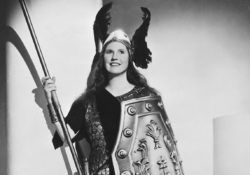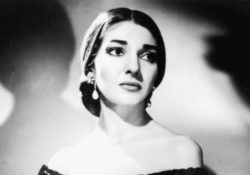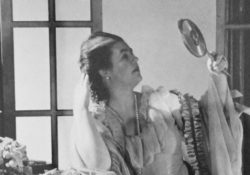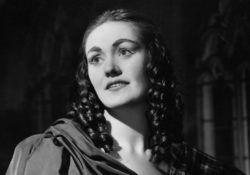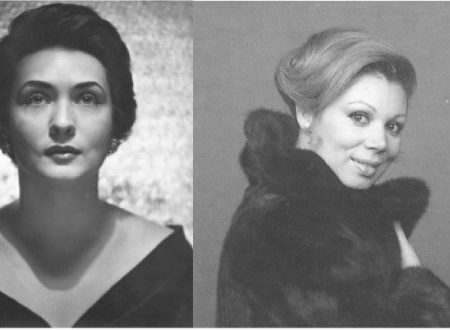Part of Iconic Voices of the Past, a series from Singers on Singing
Above: Dame Nellie Melba, circa 1900
(For more information about the Singers on Singing: Iconic Voices of the Past series, please visit the series page.)
Music Items in this Feature on Sopranos
These are the music items that are heard in this feature of Iconic Voices of the Past:
09’08”
Nellie Melba — link to the 19th century
GOUNOD: FAUST, “Ah, je ris de me voir si belle” (Jewel Song)
18’17”
Nellie Melba
Final minute of VERDI: OTELLO, “Ave Maria”
24’08”
Rita Streich (light coloratura)
J. STRAUSS II – “Frühlingstimmen”
34’43”
Germaine Féraldy (light lyric)
BRUNEAU: VIRGINIE, Air de Virginie
42’27”
Edith Mason (full lyric)
PUCCINI: MADAMA BUTTERFLY, “Un bel dì”
52’03”
Sena Jurinac (full lyric)
MOZART: COSÌ FAN TUTTE, “Per pietà”
1.07’25”
Galina Vishnevskaya (full lyric)
TCHAIKOVSKY: EUGENE ONEGIN, final portion of Letter Scene
1.19’00”
Lotte Lehmann (lyric-dramatic)
BRAHMS – DIE MAINACHT
1.26’34”
Rosa Ponselle (spinto)
VERDI: AIDA, “Ritorna vincitor!”
1.37’43”
Régine Crespin (spinto)
BERLIOZ – LES NUITS D’ÉTÉ, “Sur les lagunes”
1.49’03”
Leontyne Price (spinto)
PUCCINI: TOSCA, “Vissi d’arte”
1.58’54”
Eva Turner
PUCCINI: TURANDOT, “In questa reggia”
2.10’08”
Helen Traubel (dramatic)
WAGNER: TRISTAN UND ISOLDE, “Mild und leise”
2.24’39”
Birgit Nilsson (dramatic)
R. STRAUSS: ELEKTRA, “Was bluten muß?”
2.35’51”
Maria Callas (dramatic coloratura)
VERDI: MACBETH, “Vieni, t’affretta”
2.48’00”
Joan Sutherland (dramatic coloratura)
BELLINI: BEATRICE DI TENDA “Ah, la morte a cui m’oppresso”
Nellie Melba (Marguerite)
GOUNOD: FAUST, “Ah, je ris de me voir si belle”
(Jewel Song)
After falling instantly in love with Marguerite when he meets her at the village festival, Faust leaves a box of jewels in her garden. Although she has no idea who has given her this gift, Marguerite delights in adorning herself with the jewels and gazing at herself in a mirror. She hopes that if the man who gave her the jewels were there, he’d find her beautiful. “Marguerite, this isn’t you,” she concludes – “it’s the daughter of a king, to whom one would bow as she passes by!”
Nellie Melba (Desdemona)
VERDI: OTELLO, “Ave Maria” (brief excerpt)
Otello's cold behavior, combined with his accusations of infidelity, have terrified his innocent wife, Desdemona. Full of anxiety and foreboding, Desdemona says the “Hail Mary” before going to bed.
Rita Streich (light coloratura)
J. STRAUSS, II: "FRÜHLINGSTIMMEN"
(“Voices of Spring”)
The lyrics mention the sounds of the lark and, even more prominently, the nightingale, who both contribute to spring’s “fountain of songs” that can wrap the heart in sweetness.
Germaine Féraldy (light lyric)
BRUNEAU: VIRGINIE, Air de Virginie
The opera focuses on several events in the life of Virginie Déjazet, who, beginning in 1820, had a 50-year career as the most captivating comedienne on Parisian stages, both in the spoken word and in song. Her specialty was trouser roles, of which she created more than 100. Alfred Bruneau’s Virginie, classified as a comédie lyrique, premiered in 1931.
Edith Mason (full lyric)
PUCCINI: MADAMA BUTTERFLY, “Un bel dì”
The American naval lieutenant B. F. Pinkerton marries the young geisha Cio-Cio-San (a.k.a. Madame Butterfly), but then leaves Japan, promising to return when the robins are nesting. Three years go by, with Cio-Cio-San patiently awaiting her husband. When her maid Suzuki worries that he won’t return, Cio-Cio-San describes that beautiful day: his ship will arrive, he’ll climb the hill to the house, and he’ll call her name. “All this will happen, I promise you,” she tells Suzuki. “Keep your fears – secure in my faith, I will wait for him!”
Sena Jurinac (full lyric)
MOZART: COSÌ FAN TUTTE, “Per pietà”
Ferrando and Guglielmo are engaged to two sisters, Dorabella and Fiordiligi. The men make a wager with Don Alfonso that their fiancées can’t remain faithful for 24 hours. They then pretend to go off to battle, but then return in disguise and pay court to each other’s beloved. Fiordiligi is about to yield to Ferrando’s wooing, but then rejects him. In her monologue, she thinks of the absent Guglielmo and hopes that he’ll forgive her for this “error of a loving heart.” She concludes, “Dearest, your trust deserved a better reward.”
Galina Vishnevskaya (full lyric)
TCHAIKOVSKY: EUGENE ONEGIN, final portion of Letter Scene
At her family home in the country, Tatiana, a romantic and naive teenager, meets Onegin, a sophisticated young man from the city, and immediately falls in love with him. That night, she writes him a letter in which she pours out her feelings to him, in all their impetuosity and confusion. Finishing the letter, she wonders if she should read it through. I feel ashamed and afraid, but I put my trust in his honor!”
Lotte Lehmann (lyric-dramatic)
BRAHMS, “Die Mainacht”
Ludwig Christian Heinrich Hölty’s poem speaks of the silvery moon on a May night, which sheds light on the grass and the nightingale’s singing. The singer wanders sadly from bush to bush. Two doves coo to him delightedly, but the singer turns away, turning to darker shadows and shedding a single tear.
Rosa Ponselle (spinto)
VERDI: AIDA, “Ritorna vincitor!”
Aida, daughter of Ethiopia’s king, is a slave to Egypt’s Princess Amneris. Along with all the priests, women, and soldiers of ancient Memphis, Aida hears Amneris’s cry of “Return victorious!” as the princess and her father, the King of Egypt, send the soldiers off to battle Ethiopia. Left alone, Aida expresses her desperation, conflicted as she is between love and concern for her country and love for the warrior Radames, who commands the Egyptian army. Finally, Aida prays to the gods, hoping they will pity her suffering.
Régine Crespin (spinto)
BERLIOZ – LES NUITS D'ÉTÉ, “Sur les lagunes”
In Théophile Gautier’s profoundly moving poem, the singer laments the death of his beloved, for whom he will weep forever. An angel took her to heaven, leaving him to a bitter fate, sailing on the sea without love, with all of nature seeming to be in mourning. His soul now feels unmoored, and the night seems to spread over him as if it were a shroud. He knows he will never love any woman as much.
Leontyne Price (spinto)
PUCCINI: TOSCA, “Vissi d’arte”
Floria Tosca is a singer in Rome, where she and Mario Cavaradossi, a painter and revolutionary, are in love. Rome’s police chief, Baron Scarpia, lusts after Tosca. When he sends for her, she arrives at her office in time to hear him condemn Mario, his enemy, to execution the following morning. Desperate to save Mario’s life, Tosca turns to God, wondering why, after she has lived a life devoted to art and love, she is now repaid in this way.
Eva Turner
PUCCINI: TURANDOT, “In questa reggia”
In ancient Peking, Prince Calaf has fallen in love with Princess Turandot from afar. Despite the protestations of his father, the exiled Tartar king Timur, and Liû, the devoted slave girl who loves Calaf, the prince decides to become the latest suitor for Turandot’s hand. He must answer three riddles; all previous suitors have failed to do so, paying with their lives. Before Peking’s people, Turandot explains that she drives this terrible bargain because thousands of years before, after a battle in which the kingdom was defeated, her ancestor, Princess Lo-u-Ling, was abducted and killed. To avenge her, Turandot has declared that no man will ever possess her. “There are three riddles,” she says, “and one of them is death!”
Helen Traubel (dramatic)
WAGNER: TRISTAN UND ISOLDE, “Mild und leise”
Isolde rushes by ship to Tristan’s ancestral home, Kareol, where he lies wounded, impatiently awaiting her. He has time to see her only for a moment before he dies. Isolde falls in a faint. Her husband, King Marke, has come in a second ship. Melot, the jealous knight who had wounded Tristan, is killed by Tristan’s servant Kurwenal, who in turn is killed by Marke’s men. Isolde revives and, in her “Liebestod” (“Love-Death”), seems to see a shining vision of Tristan, drawing her into a world of ecstasy, until she falls lifeless onto his body.
Birgit Nilsson (dramatic)
STRAUSS: ELEKTRA, “Was bluten muß?”
King Agamemnon of Mycenae has been killed by his wife, Klytämnestra, and her lover, Aegisth. Elektra, daughter of Agamemnon and Klytämnestra, is obsessed with avenging her father’s murder. In a lengthy confrontation with her mother, Elektra learns that Klytämnestra feels tortured by awful dreams and unnerving anxiety. Klytämnestra declares that she will discover whose blood must flow that will allow her to sleep in peace. In an outburst of triumphant defiance, Elektra proclaims that blood will flow from the neck of Klytämnestra herself -- a huntsman will chase her through the palace and finally overtake her. “You’ll no longer dream,” Elektra exults, “I will have no need to dream, and everyone who still lives will rejoice!”
Maria Callas (dramatic coloratura)
VERDI: MACBETH, “Vieni, t’affretta”
Lady Macbeth has just read a letter from her husband, indicating that the first event in the witches’ prophecy has come to pass: Macbeth, previously Thane of Glamis, is now Thane of Cawdor. The witches also have predicted that he will become King of Scotland. In her cavatina, Lady Macbeth declares that she will give him courage to accept the gift offered by the prophecy. “Ascend to the throne,” she says, “and reign!”
Joan Sutherland (dramatic coloratura)
BELLINI: BEATRICE DI TENDA “Ah, la morte a cui m’oppresso”
Filippo Visconti, Duke of Milan, is bored with his wife Beatrice (the previous Duke’s widow), and begins an affair with Agnese. The young, handsome Orombello is in love with Beatrice, and when the two are together and surprised by Filippo, he imprisons them. Orombello, under torture, implicates Beatrice, who is condemned to death by her husband. Agnese, who’d plotted to discredit Beatrice, is forgiven by her. In the opera’s finale, the innocent Beatrice goes noblyand bravely to her execution,declaring that rather than suffering in death, she will triumph. “I leave my pain behind,” sings Beatrice, who already sees before her “the royal throne of the Almighty.”
